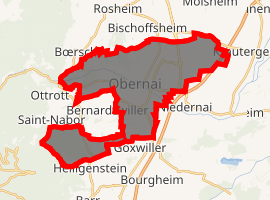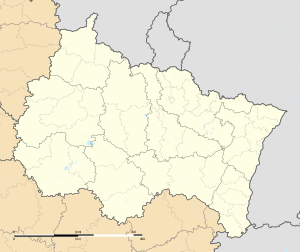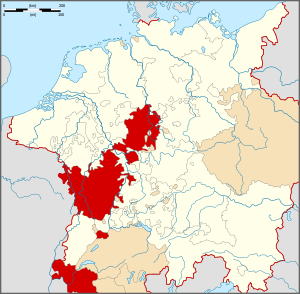Obernai
Obernai (Alsatian: Owernah; German: Oberehnheim) commune in the Bas-Rhin department in Alsace in north-eastern France. It lies on the eastern slopes of the Vosges mountains.
Obernai | |
|---|---|
Place du marché | |
 Coat of arms | |
Location of Obernai 
| |
 Obernai  Obernai | |
| Coordinates: 48°28′N 7°29′E | |
| Country | France |
| Region | Grand Est |
| Department | Bas-Rhin |
| Arrondissement | Sélestat-Erstein |
| Canton | Obernai |
| Government | |
| • Mayor (2014–2020) | Bernard Fischer |
| Area 1 | 25.78 km2 (9.95 sq mi) |
| Population (2017-01-01)[1] | 11,279 |
| • Density | 440/km2 (1,100/sq mi) |
| Time zone | UTC+01:00 (CET) |
| • Summer (DST) | UTC+02:00 (CEST) |
| INSEE/Postal code | 67348 /67210 |
| Elevation | 156–572 m (512–1,877 ft) (avg. 185 m or 607 ft) |
| 1 French Land Register data, which excludes lakes, ponds, glaciers > 1 km2 (0.386 sq mi or 247 acres) and river estuaries. | |
Imperial City of Obernai Reichstàdt Owernah (gsw) Reichsstadt Oberehnheim (de) | |||||||||
|---|---|---|---|---|---|---|---|---|---|
| ca 1283–1648 | |||||||||
 Coat of arms
| |||||||||
| Status | Free Imperial City of the Holy Roman Empire | ||||||||
| Capital | Obernai | ||||||||
| Government | Republic | ||||||||
| Historical era | Middle Ages | ||||||||
• Founded | 778 | ||||||||
• Gained town rights | 1240 the 13th century | ||||||||
• Gained Reichsfreiheit | ca 1283 | ||||||||
• Joined Décapole | 1354 | ||||||||
• Lost Reichsfreiheit | 1648 | ||||||||
• Annexed by France | 1679 | ||||||||
| |||||||||
Obernai is a rapidly growing city, its number of inhabitants having gone up from 6,304 in 1968 to 11,099 in 2006.[2] The metropolitan area of Obernai had 12,369 inhabitants in 2006, from 7,293 in 1968.[3]
History
The Obernai region, which was the property of the dukes of Alsace in the 7th century, is the birthplace of St. Odile, daughter of the Duke, who would become the Patron Saint of Alsace.
The Obernai name first appears in 1240, when the village acquires the status of town under the tutelage of the Hohenstaufen family. The town then prospered. It became a member of the Décapole in 1354, an alliance of ten towns of the Holy Roman Empire in Alsace. Obernai's status reaches its apex in the 15th and 16th century. In 1562, Emperor Ferdinand I visited the prosperous town of Obernai.
The Thirty Years' War (1618–48) damaged the town, which was occupied by the Imperial troops, then by the Swedes. The town was ransomed and ceded to France in 1679, and started to recover some of its prosperity, without totally recapturing its former glory.
The town was annexed by Germany in 1871 with the rest of Alsace, then returned to France after World War I in 1918. During the German occupation in the Second World War, the Nazi authorities set up the Reichsschule für SS Helferinnen Oberenheim, a Waffen-SS women's training centre, which opened in May 1942 upon the order of Heinrich Himmler.[4]
Economy
Obernai is an important center of wine and beer production, as well as a touristic destination. The industrial activity features the following companies: Hager, Kronenbourg, Triumph, Sobovia, Supra and Stoeffler. The historical wine of the city is called the Vin du Pistolet in reference to a local legend.
Sights
- Domaine de la Léonardsau (19th century – early 20th century): current museum of the horse and the horse carriage.
- Truttenhausen abbey (in ruin): old monastery of the regular canons of St-Augustin (15th century).
- Gail Castle (1826–27): Currently the Freppel High School
- Oberkirch Castle: rebuilt between 1843 and 1846 with the characteristics of an older fortified castle of the 16th or 17th century.
- El Biar Castle: Built between 1864 and 1865 on the site of an old flour mill, by General de Vives (1802, 1884); it is named after a residential section of Algiers.
- Old six-bucket well (1579)
- Clocktower (Kappelturm)
- Wheat Market (Halle aux Blés)
- Romanesque house in the rue des Pélerins
- Old Synagogue [6]
Notable people
Born in Obernai
- Nicolas Léonard Beker
- Jean-Victor Hocquard (1910–1995), musicologist
- Charles-Émile Freppel
- Thomas Murner
- André Neher
- Charles Pisot
Active in Obernai
- John Stintzi, Marianist brother and academic, taught in the village during the 1840s[5]
See also
- Klevener de Heiligenstein, a wine style produced in Obernai
- Communes of the Bas-Rhin department
References
- "Populations légales 2017". INSEE. Retrieved 6 January 2020.
- Commune : Obernai (67348) Archived 2012-04-29 at the Wayback Machine on INSEE
- Aire urbaine 1999 : Obernai (340) on INSEE
- Gerhard Rempel, Hitler's Children (University of North Carolina Press: 1989) pp. 224-232.
- Garvin, John E. (1917-01-01). The Centenary of the Society of Mary. Brothers of Mary.
- (in German) Zur Geschichte der jüdischen Gemeinde und der Synagogen in Oberehnheim
External links
| Wikimedia Commons has media related to Obernai. |
| Wikisource has original text related to this article: |

